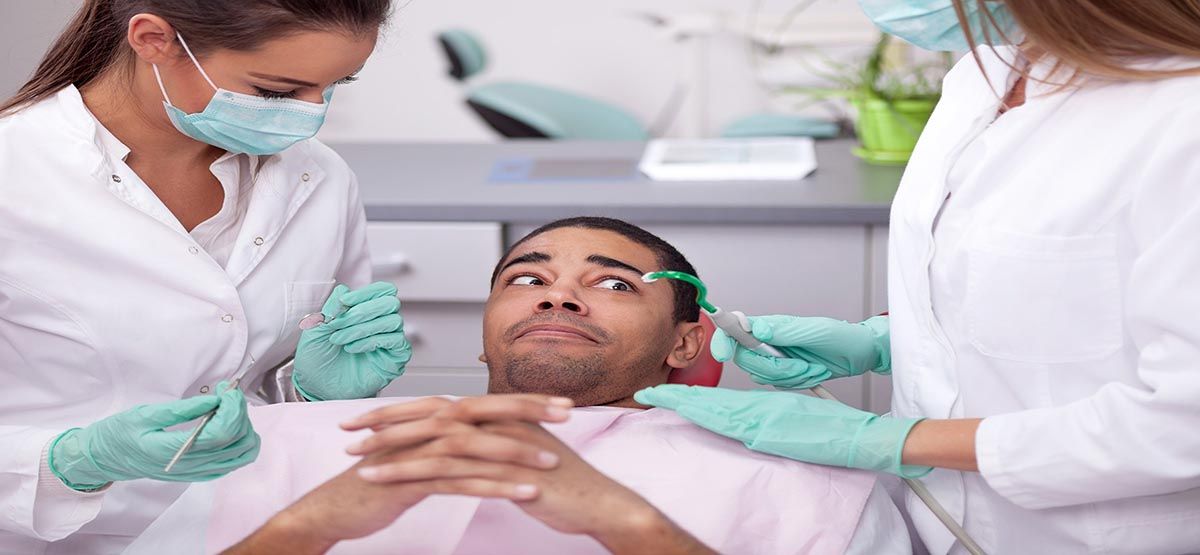
Why Fear Of The Dentist Is So Common?
Dentophobia (odontophobia), or fear of dentists, is a common phobia among people of all ages. It is sometimes related to iatrophobia, or fear of doctors, as well as trypanophobia, or fear of needles. Dentophobia can be mild or severe and can eventually lead to serious health problems.
Dentophobia can be divided into several elements. Most people with this phobia fear more than one element, while those with severe dentophobia may fear all or most elements simultaneously.
Main reasons associated with fear of the dentist:
- Pain: Until recently, completely painless dentistry was difficult or impossible. Even today, some procedures may involve a small amount of pain. Many people are extremely sensitive to pain in their mouth and fear that the pain could be unbearable.
- Numbness or choking: some people, especially those who have had choking or difficulty breathing, are afraid of having a numb mouth. You may worry that you won't be able to breathe or swallow.
- Sounds and smells: many people, especially those who have had bad experiences with dentists in the past, are afraid of the sounds and smells of a dental office, especially the sound of the drill.
- Needles: If you are phobic about needles, you might be terrified of the injections that dentists use to numb your mouth.
Complications
Whether due to genetics or behavior, oral health varies dramatically from person to person. Some people manage to last for years between visits to the dentist, with little or no impact on their teeth or gums. Others are prone to tooth decay and gum disease, regardless of how often they brush and floss. If you're not one of the lucky few, dentophobia can have real consequences in your life.
Tooth decay gets worse over time. Small cavities that could previously be easily filled can lead to broken and decayed teeth, requiring expensive and invasive root canal therapy and reconstructive work. That knowledge can, in turn, make you even less likely to seek treatment, creating a vicious cycle.
In the modern world, we are expected to have clean, healthy and shiny teeth. If your teeth become broken and rotted due to decay and neglect, you may experience social stigma. It can be more difficult to get certain jobs. Dating can be affected and even your friends can start talking. This can lead to isolation, depression, social anxiety and even social withdrawal.
In some cases, dental problems can cause infection. Failure to treat the infection can cause it to spread, causing medical illnesses. Infected tissues also hurt, so pain is not an uncommon effect of dentophobia.
How to deal with fear of the dentist
If your dentophobia is severe and paralyzing, it is best to consult a trained mental health professional before starting dental treatment. Cognitive-behavioral therapy, medication and hypnosis can help you control fear.
When your phobia is at a manageable level, you can visit the dentist. However, it is important to choose the right dentist. Today's dentistry is very different than what you may remember. However, not all dentists use the same methods and techniques to help patients with phobias.
It is always acceptable to schedule an initial consultation without a thorough examination and preliminary assessment. When calling for the appointment, explain that you suffer from dentophobia and are not ready to schedule a full exam. This initial consultation will allow you to develop a relationship with the dentist and get used to his manners and behavior.
As you move on to other appointments, remember that you are always in control. Set up a signal with your dentist that you can use when you need a break and a different signal to let the dentist know you need more anesthetic. Even issues such as how far back the chair is tilted and the order of work performed can be discussed in advance.
Talk to your dentist about the availability of sedatives that will allow you to sleep through the dental procedure.